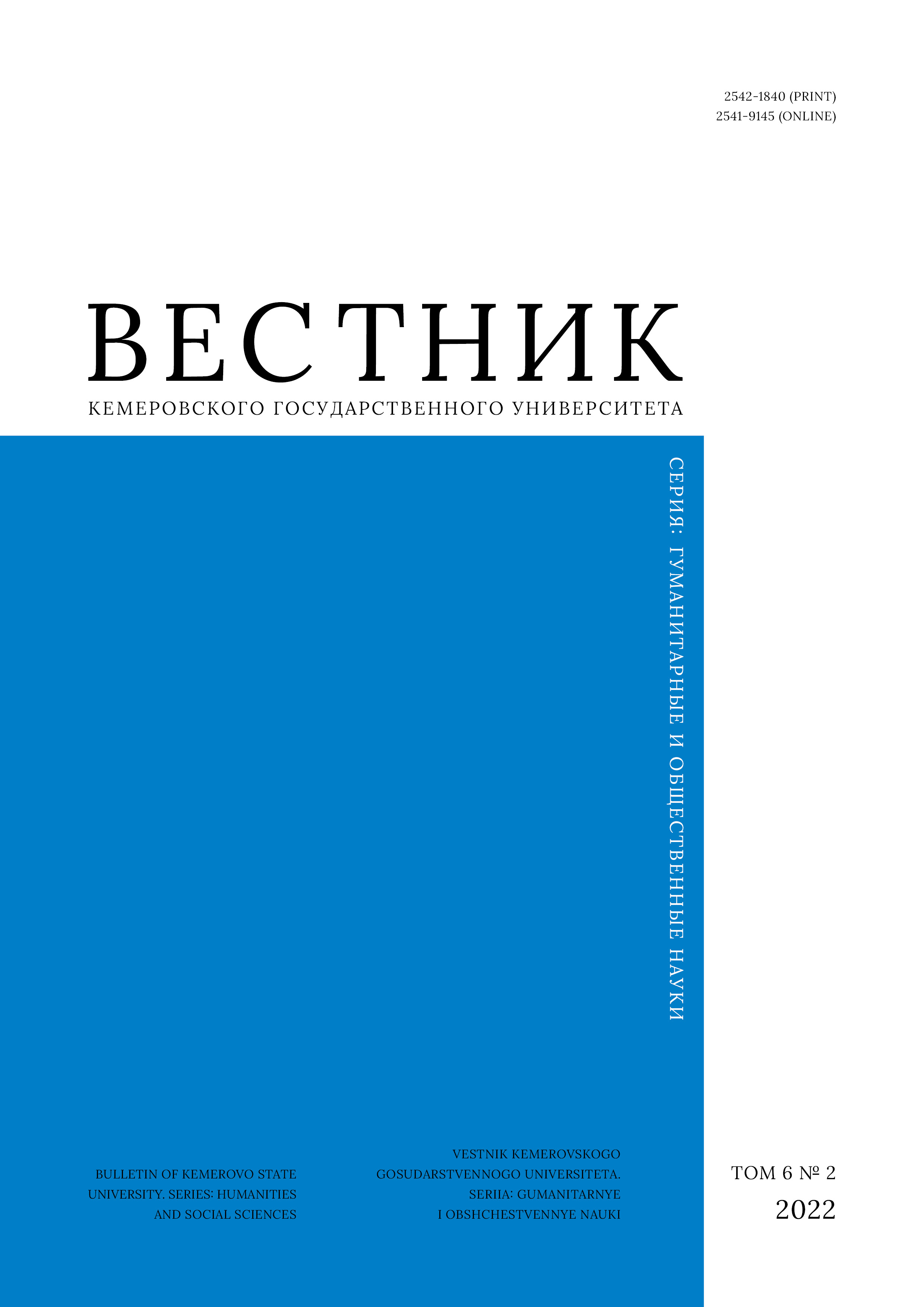from 01.01.2018 to 01.01.2019
Kemerovo, Russian Federation
Russian Federation
The article features the content characteristics of self-reliance in adolescent students in conjunction with such personality parameters as adaptability and behavior strategies. The research objective was to identify, substantiate, and interpret specific manifestations of psychological space integrity in order to improve academic environment. The article describes the content of the self-reliance phenomenon and introduces the results of a study of how various academic environments affect its development, e.g., in boarding-school students. The experiment involved 46 comprehensive school students aged 16–17 and covered the dependence of self-reliance on gender factor and personality. The results can help improve the organization of academic space environment.
self-reliance, academic space, teenage students, boundaries of psychological space, autonomy, self-reliance mechanisms, adaptability, locus of control, gender differences
1. Telegina S. Ya. The sovereignty of psychological space among teens living in native and non-native culture. Vestnik SPbSU. Series 16. Psychology. Education, 2016, (4): 146-157. (In Russ.) https://doi.org/10.21638/11701/spbu16.2016.412
2. Nartova-Bochaver S. K. Human sovereign: a psychological study of the subject in his being. St. Petersburg: Piter, 2008, 400. (In Russ.)
3. Karabanova O. A., Poskrebysheva N. N. The development of the personality autonomy in adolescence in the childparent and adolescentpeer relations. Vestnik Moskovskogo universiteta. Seriya 14: Psikhologiya, 2011, (2): 36-47. (In Russ.)
4. Lukov M. Yu. Characteristics of personal autonomy of teenagers studying in general and vocational secondary educational institutions. Vestnik NovSU, 2014, (79): 93-96. (In Russ.)
5. Levkova T. V. Serviranity of psychological space as the basis of personality's psychological health. Vestnik DVGSGA, 2010, (1-2): 63-67. (In Russ.)
6. Shchukina M. A., Zhdanova A. A. Zones of psychological space of a personality. Petersburgskii psikhologicheskii zhurnal, 2017, (18): 112-139. (In Russ.)
7. Shapovalenko A. A. Diagnosis characteristics of personal sovereignty in the Internet environment: development of a questionnaire. Uchenye zapiski Rossijskogo gosudarstvennogo social'nogo universiteta, 2015, 14(2): 20-25. (In Russ.) https://doi.org/10.17922/2071-5323-2015-14-2-20-25
8. Skorova L. V. Formation of sovereignty of the psychological space of senior adolescents. Sibirskiy Psikhologicheskiy Zhurnal, 2013, (48): 75-83. (In Russ.)
9. Kazakova T. V., Loginova I. O. Particularly teachers with different levels of psychological sovereignty. Psikhologiia obucheniia, 2014, (6): 81-90. (In Russ.)
10. Nartova-Bochaver S. K. On the nature of psychological sovereignty: relation to the temper. Vestnik of Saint Petersburg University. Psychology, 2018, 8(4): 370-380. (In Russ.) https://doi.org/10.21638/11701/spbu16.2018.405
11. Buravtsova N. V. Self-reliance of psychological space as a factor contributing to the development of the value-semantic space of personality. Vestn. Novosib. gos. un-ta. Seriia: Psikhologiia, 2008, 2(1): 45-49. (In Russ.)
12. Kocharian A. S., Makarenko A. A., Zhao X. Features of sovereignty psychological space have persons with different level of emotional maturity. Perspectives of Science and Education, 2016, (1): 35-39. (In Russ.)
13. Panina E. N. The relationship between the self-reliance of psychological space and subjective well-being of the individual. Cand. Psychol. Sci. Diss. Krasnoyarsk, 2006, 187. (In Russ.)
14. Vodinchar E. A., Orlik L. A. Correlation between sovereignty of psychological space and specifics of interpersonal relations. Vestnik KRAUNTS. Gumanitarnye nauki, 2016, (1): 48-56. (In Russ.)
15. Kharlamenkova N. E. Psychological safety and sovereignty of personality with expressed post-traumatic stress. Gumanitarnye issledovaniya v Vostochnoi Sibiri i na Dal'nem Vostoke, 2015, (4): 90-97. (In Russ.)
16. Martirosyan K. V. The sovereignty of personal space as a subject of theoretical and empirical psychological research. Naukovedenie, 2013, (6). Available at: http://naukovedenie.ru/PDF/65PVN613.pdf (accessed 4 Mar 2022). (In Russ.)
17. Trofimova Ju. V. Sovereignty manifestation in the preadult age: differences of subjective subjective characteristics of an individual. Mir nauki, kul'tury, obrazovaniya, 2012, (6): 336-339. (In Russ.)
18. Safonova M. V., Tikhonova D. A. Comparative analysis of sovereignty profiles among adolescents with various levels of psychological sovereignty. Vestnik KGPU im. V. P. Astafyeva, 2017, (3): 114-125. (In Russ.) http://dx.doi.org/10.25146/1995-0861-2017-41-3-11
19. Martynenko E. A. Psychological sovereignty of the individual as a condition of the person's boundaries. Azimut of Scientific Research: Pedagogy and Psychology, 2019, 8(3): 349-352. (In Russ.) https://doi.org/10.26140/anip-2019-0803-0090
20. Ekimova V. I., Orlova E. A. Educational environment cadet corps as a factor in the formation of the sovereignty of psychological space of the individual students-boys. Vestnik Shadrinskogo gosudarstvennogo pedagogicheskogo universiteta, 2016, (3): 33-36. (In Russ.)
21. Klochko A. V., Krasnoryadtseva O. M. Sovereignty as a result of man making in combined psychological system. Vestnik BGPU: Psikhologo-pedagogicheskie nauki, 2001, (1-1): 4-8. (In Russ.)
22. Vikdorova N. A., Morozova I. S., Morozov E. V. The establishment of the sovereignty of the individual adolescent in the terms of civil-patriotic education. Professional Education in Russia and Abroad, 2016, (4): 25-29. (In Russ.)
23. Smirnova Ya. K. Approach to sovereign self-determination in the context of temporal orientations of the individual. Izvestiia Alt. gos. un-ta, 2014, (2-1): 75-78. (In Russ.) https://doi.org/10.14258/izvasu(2014)2.1-14
24. Klochko V. E., Galazhinskiy E. V. Self-realization of personality: systemic view. Tomsk: TSU, 1999. 154. (In Russ.)
25. Nartova-Bochaver S. K. The revised version of "The personal sovereignty questonnaire - 2010". Psikhologicheskii zhurnal, 2014, 35(3): 105-119. (In Russ.)
26. Fetiskin N. P., Kozlov V. V., Manuilov G. M. Diagnostics of socio-psychological adaptation (C. R. Rogers and R. F. Dymond). Socio-psychological diagnostics of the development of personality and small groups. Moscow: Institut Psikhoterapii, 2002, 136-139. (In Russ.)
27. Melnikova N. N. Methodology for the study of strategies of adaptive behavior. Diagnostics of socio-psychological adaptation of personality. Chelyabinsk: SUSU, 2004, 30-58. (In Russ.)
28. Chebrovskaya S. V. Psychological conditions for developing independence in students. Cand. Psychol. Sci. Diss. Komsomolsk-on-Amur, 2003, 157. (In Russ.)
29. Borovskikh T. A. Diagnosing students' peculiar features and taking them into account in teaching. Nauka i shkola, 2010, (5): 56-59. (In Russ.)
30. Tolbatova E. V. Psycho-pedagogical features of organization of educational activity of adolescent schoolchildren. Research Result. Pedagogy and Psychology of Education, 2015, 1(1): 67-74. (In Russ.)


















